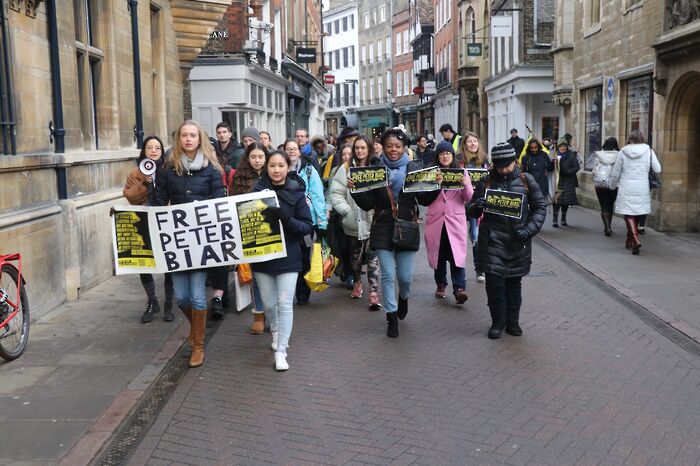‘Cage campaign’ protests arbitrary detention of Cambridge PhD student facing the death penalty in South Sudan
Protesters from Cambridge University Amnesty International camped in a wooden cage outside King’s College for 48 hours

Last weekend, protesters camped in a small wooden cage outside King’s College for 48 hours to protest the detainment of Cambridge PhD student and activist Peter Biar Ajak, currently illegally detained and facing the death penalty in South Sudan.
Members of Cambridge University Amnesty International (CUAI) protested from 6pm on Friday until 6pm on Sunday as part of the organisation’s annual ‘Cage Campaign’, which has taken place for over 40 years. This campaign seeks to raise awareness of human rights abuses worldwide, with this year’s protest focusing specifically on the plight of Peter Biar Ajak.
Ajak, 35, a PhD student at the University, has been detained without charge in his home country of South Sudan since 28 July 2018, in a notorious prison known as the Blue House. This is illegal, as the South Sudanese constitution states that no one can be held without charge for more than 24 hours.
The main aim of the protest was to gather signatures in support of Ajak’s release, written on an 8 metre long piece of cloth positioned in front of the cage on King’s parade, and to raise as much awareness about his detainment as possible. The cloth will be sent to central Amnesty International “to provide a symbol and a glimpse of just how many people are thinking about him” and to offer evidence of the strength of support for Ajak’s release.
Ella McCoshan, CUAI’s Cage Campaign coordinator, told Varsity that “in deciding on a theme for this year’s Cage Campaign, our team wanted to pick something which fitted the idea of ‘human rights on your doorstep’. Not only did we feel this would make for a Cage Campaign which is more effective and closer-to-home, we also wanted to target something we felt we could really contribute to.”
Ajak fled South Sudan as a child refugee and has since been a vocal critic of the country’s regime. He was returning to the country in July to attend a youth forum organised by the Red Army Foundation, which was created by former child soldiers seeking to address social issues in South Sudan, when he was arrested at Juba International Airport.
His lawyer Jared Genser recently told the BBC that Ajak is facing the death penalty, with the Sudanese government considering charging him with treason or terrorism. This has been met with outrage, from Cambridge to the US Congress. Ajak has still not been formally charged.
McCoshan said that CUAI believe Ajak’s detainment and possible sentencing is “completely unjust and wrong for a man who stood up for so many, and advocated human rights and protected political speech”, describing the conditions in which he has been held as an “atrocity.”
CUSU passed an emergency motion in support of Ajak in October 2018, acknowledging that the majority of Cambridge’s student body were unaware of his situation. The motion stated that “Peter is a political prisoner and should be released immediately.” It added that “the student body of Cambridge University is highly politically active, and that any commitment or encouragement of activism is significantly weakened if we fail to stand up for everybody’s right to protest, including those of our fellow students internationally.”
A petition calling for Ajak to be released, which states that “Peter has always kept his focus on South Sudan and his hope for a peaceful future for his country”, has gathered over 100,000 signatures. His case has also been taken up by high-profile figures worldwide, including Congresswoman Madeleine Dean, who highlighted Ajak’s plight in the United States House of Representatives.
Cambridge Vice-chancellor Stephen Toope made an appeal for Ajak’s release to the President of the Republic of South Sudan, Salva Kiir Mayardit, in September 2018, and the University has also sent a formal request to the UN Working Group on Arbitrary Detention to intervene in Ajak’s case “as a matter of urgency”. So far, however, the South Sudanese National Security Service and government have been “unresponsive”.
McCoshan told Varsity that CU Amnesty International intends to “keep up pressure and attention to ensure that this is not just a single headline which is then forgotten the next day”. Addressing the lack of awareness of Ajak’s plight among Cambridge students, she added that: “We hope and believe that this campaign has gone a long way in changing that.”
 News / SU reluctantly registers controversial women’s soc18 December 2025
News / SU reluctantly registers controversial women’s soc18 December 2025 Features / Should I stay or should I go? Cambridge students and alumni reflect on how their memories stay with them15 December 2025
Features / Should I stay or should I go? Cambridge students and alumni reflect on how their memories stay with them15 December 2025 News / Dons warn PM about Vet School closure16 December 2025
News / Dons warn PM about Vet School closure16 December 2025 News / Cambridge study finds students learn better with notes than AI13 December 2025
News / Cambridge study finds students learn better with notes than AI13 December 2025 News / Uni registers controversial new women’s society28 November 2025
News / Uni registers controversial new women’s society28 November 2025










